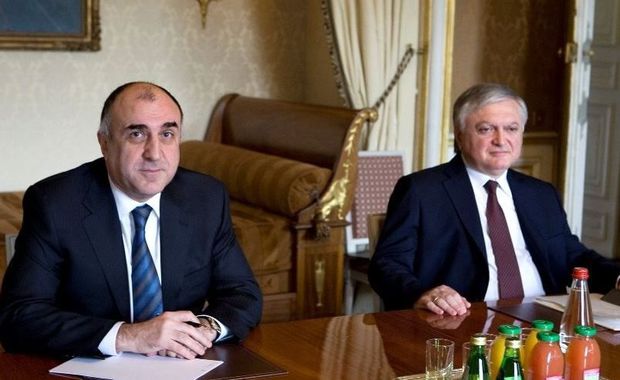Armenian and Azerbaijani FMs discuss Karabakh problem
 Photo: rusarminfo
Photo: rusarminfo
The Foreign Ministers of Armenia and Azerbaijan held a meeting on 11 July.
As was reported after the meeting, ‘modalities of advancement of the Nagorno-Karabakh negotiation process were discussed at the meeting’.
The official report ended as follows: “The Co-chairs asked the ministers to convey to the Presidents their proposal on organizing a summit this year. It was agreed to convene the Foreign Ministers’ next meeting on the sidelines of the UN General Assembly session, in New York, in September this year.”
Reports from Azerbaijan
Initially, the Azerbaijani and Armenian Foreign Ministers were expected to meet on the sidelines of the OSCE Informal Ministerial meeting, in Mauerbach, in the vicinity of Vienna. However, at the very last moment, the meeting venue was changed to Brussels for some unknown reason.
Hikmet Hajiyev, a spokesperson for the Azerbaijani Foreign Ministry, said yesterday that ‘Baku expects that talks on the Nagorno-Karabakh conflict settlement between the Foreign Ministers of Azerbaijan and Armenia, scheduled for Tuesday in Brussels, will be held in a serious and effective manner’.
“The current state of the negotiation process, as well as holding of talks in a serious and effective manner, will be in focus at the Azerbaijani and Armenian Foreign Ministers’ meeting,” Hikmet Hajiyev, an Azerbaijani Foreign Ministry Spokesperson, told Interfax-Azerbaijan news agency.
The details of the Brussels talks haven’t been revealed. As reported, the sides agreed to convene the Foreign Ministers’ next meeting on the sidelines of the UN General Assembly session in New York, in September this year.
The OSCE Minsk Group Co-Chairs also stood with the initiative to hold a meeting between the Presidents of the two countries.
Reports from Armenia
The Brussels meeting was in focus of the Armenian mass media’s attention. As was reported ahead of the meeting, it would be held on the initiative and with participation of the OSCE Minsk Group Co-Chairs.
Since the official reports, as usual, provide minimum details, one could only guess what was going on at the negotiation table.
The content of the Armenian Foreign Minister’s conversation with his Azerbaijani counterpart during the meeting could be assumed from the text of his speech at the OSCE Informal Ministerial meeting, held a few hours before the talks.
As Minister Nalbandian pointed out, Azerbaijan backtracked from the agreements reached during the talks following the large-scale military actions on the Karabakh contact line, in April 2016. At the Summits in Vienna and St. Petersburg, it was agreed to establish mechanisms for the investigation of ceasefire violations, as well as to comply with the 1994-1995 trilateral ceasefire agreement.
The Armenian Foreign Minister stated as follows: “Such actions put in question Baku’s credibility for being a party to negotiations … on 4 July, the Azerbaijani leadership once again resorted to the tactics of notorious terrorist organizations and, like many times before, used its civilian population as a human shield for shelling the territory of Nagorno-Karabakh (NKR) by heavy weaponry, including multiple rocket launcher systems. In response to that, the NKR Defense Army had to resort to self-defense.
“As long as Azerbaijan fails to honor its international commitments … it’s the Azerbaijani leadership that bears full responsibility for the consequences of its provocative actions.”
At the end, Edward Nalbandian stated as follows: “We are bound together to advance the cause of peace and security through the OSCE. We will continue to be actively involved in all efforts aimed at building cooperation, consent and trust in the OSCE area.”


















